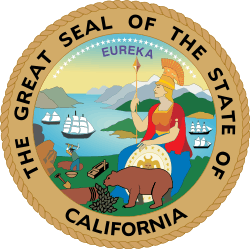California Proposition 32, 2012
| Elections in California | ||||||||||
|---|---|---|---|---|---|---|---|---|---|---|
 | ||||||||||
|
||||||||||
|
||||||||||
Proposition 32 is a California ballot measure that was decided by California voters at the statewide election on November 6, 2012. This initiative statute would have affected political contributions via payroll deductions, and contributions to political candidates. The proposition was defeated by voters by a margin of 56 to 44 percent.[1]
Details
If passed, Proposition 32 would do the following:
- Prohibit unions from using payroll-deducted funds for political purposes (the same restriction applying to payroll deductions, if any, by corporations and government contractors)
- Permit voluntary employee contributions to an employee-sponsored committee or union with yearly written authorization.
- Ban contributions to candidates and candidate-controlled committees by corporations and labor unions. Other political expenditures remain unrestricted if not limited due to being from payroll deductions.
- Ban contractors who receive government contracts (including public-sector labor unions with collective bargaining agreements) from donating to office holders involved in awarding the contract or committees controlled by said officers.[2]
Editorial opinions
The North County Times states that Proposition 32 "does nothing to stifle unions' political voices -- despite claims to the contrary. Prop. 32 simply institutes an opt-in system for each employee's political donations." .
The Los Angeles Daily News notes that Proposition 32 leaves the decision on how to contribute political funds to workers, not unions. In other words, "unions will still have the power of numbers. Their members will continue to be able to mobilize in support of candidates and political stands, and to donate money on their own, but it would be their decision."
According to the Press Enterprise, "the meat of Prop. 32 is a ban on the use of payroll deductions to finance political spending. That provision targets one of the largest special interests in California politics: public employee unions. Automatic deductions from paychecks are the primary way unions fund political campaigns — and ending that financing mechanism would ease unions’ stranglehold on political decisions."
In mid-August 2012, Los Angeles Times' columnist Michael Hiltzik wrote that the proposition would exempt "such common business structures as LLCs, partnerships and real estate trusts", that the drafters included "conservative attorneys Thomas Hiltachk and Michael Capaldi", and concluded by citing a Center for Responsive Politics statistic that "business outspends organized labor 15 to 1". Supporters say the proposition allows workers to decide where their money is spent; opponents say it is a bill designed for corporations to legally fund millions of dollars to their candidates.[3]
The Wall Street Journal published a late-August 2012 profile of pro-proposition campaigner and former Democratic state legislator Gloria Romero who said that unions were too powerful in Sacramento and "must be brought down" before they cause the state to become bankrupt.[4] Romero said it was "telling" that advertisements against the measure "don't mention unions."[4]
On Labor Day weekend, political science professor and associate vice president of the California Faculty Association Andy Merrifield and League of Women Voters representative Dee Dee Bridges wrote against the proposition as "a particularly cynical ballot initiative ... to deny participation in the political process to working people".[5]
References
- ↑ Maciag, Mike (November 7, 2012). "California Unions Help Defeat Ballot Measure Targeting Campaign Donations". Governing. Retrieved 10 November 2012.
- ↑ "Proposition 32 - Official Title and Summary" (PDF). California Secretary of State. Retrieved October 17, 2012.
- ↑ Hiltzik, Michael, "Proposition 32: A fraud to end all frauds", Los Angeles Times, August 19, 2012. Larry Sand, a retired teacher who taught for more than 28 years in California and New York, responded on August 24, 2012. Retrieved 2012-09-03.
- 1 2 Finley, Allysia, "Gloria Romero: The Trials of a Democratic Reformer", Wall Street Journal, August 31, 2012. Retrieved 2012-09-03.
- ↑ Merrifield, Andy, and Dee Dee Bridges, "Guest Opinion: California's main threat to labor: Prop. 32", September 2, 2012. Retrieved 2012-09-03.
External links
- Official CA Voter Information Guide - Proposition 32
- Official Yes on Prop 32 website
- Official No on Prop 32 website
- League of Women Voters of California Education Fund Pro/Con video, summary, and "In Depth" information
- SmartVoter.org Proposition 32 web page